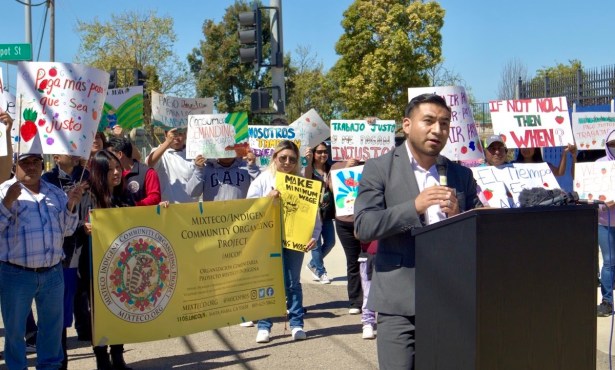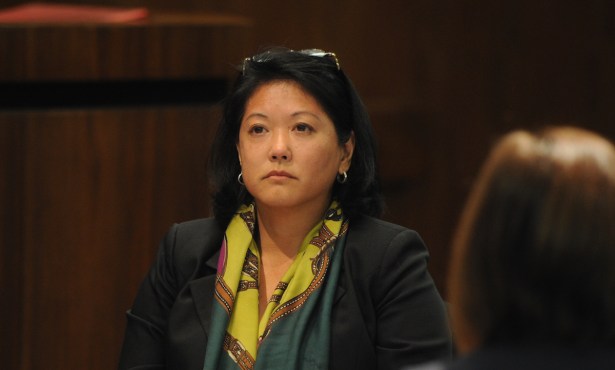Grocery Workers Vote to Strike
Talks Continue, Picket Lines Not Likely Immediately

In weeklong balloting that concluded on March 26, grocery union members voted to strike for better wages and conditions. The grocery store workers cited “unfair labor practices” as well as high profits by the grocery industry during the pandemic while they worked in difficult conditions, with illness and even some deaths among union ranks. Ralphs, Albertons, Vons, and Pavillions markets may see picket lines, though negotiations resume March 30, according to a union press release.

“After all the hard work we’ve done through the COVID pandemic serving customers so they can feed their families, we deserve to be able to feed ours,” Rachel Fournier, a cashier at a Ralphs grocery store in Los Angeles and a member of the union Bargaining Committee, is quoted as saying in the union statement. Seven union Locals for the United Food and Commercial Workers (UFCW) demanded a $5 an hour increase for food clerks over three years, and by the time talks had ended, the grocery stores had offered $1.80.
In a statement, the Albertsons/Vons stores — which merged in 2014 — said: “Our goal with every negotiation is to provide our employees with a competitive total compensation package of wages, health, welfare, and pension benefits. We are committed to working collaboratively to ensure that we reach an agreement that is fair to our employees, good for our customers, and allows Albertsons, Vons, and Pavilions to remain competitive in the Southern California market.”
The union pay scale currently starts at $15.20 for baggers and $22.50 for checkers. But it takes a bagger 1,000 hours of work to get a dime increase, said Michael Bott, who works at a Santa Barbara Vons and is a member of Local 770. It takes 9,800 hours to reach the top of the scale. “That’s five years at full-time work,” Bott said, “but in a grocery store, it’s hard to get 40 hours a week guaranteed.”
Sign up for Indy Today to receive fresh news from Independent.com, in your inbox, every morning.
Grocery workers are now guaranteed a minimum of 24 hours a week, and with 15 years of seniority, it’s 28 hours a week. The need for workers varies with the holidays and summertime, Bott explained, and the variety works for some part-timers, like students or seniors who don’t want to work full time. “But others with families need as much as they can,” he said. They received a $5 increase in “hero pay” for eight weeks, “and it was awesome to get that much more in your paycheck,” he said. “Some of us were able to set a little money aside.”
Contract talks began in January and the current union contract ended on March 6, but by the time of the vote, the union and stores remained $3.20 apart on hourly wages. The union also stated their demands for more hours, staffing, and safety in the stores were not addressed. Kroger — the parent company for Ralphs — made $4 billion in profits in 2021, the union charged. And bonuses paid to some workers were token amounts. A recent survey by the union of Kroger employees found that 14 percent were homeless and 78 percent struggled to put nutritious foods on the table for their families.
The Ralphs stores stated new wages amounted to $141 million and health costs remained the same in their proposal to the union. “Our three goals throughout negotiations are to reward and invest in our people, keep groceries affordable for our customers, and maintain a sustainable business that creates jobs in the future. Ralphs’ proposal meets all three goals. The current UFCW proposal only meets one of those goals,” said Robert Branton, operations vice president at Ralphs. The statement claimed the union increase of 20 percent — Ralphs offered 9 percent to cashiers — raised grocery prices by $400 a year for customers.
The union called for an “unfair labor practices” strike and filed charges with the National Labor Relations Board on behalf of its 47,000 workers in seven Southern and Central California union locals. They claim protesting workers have been intimidated and given fewer hours in retaliation for informing customers of the issues, the stores had failed to implement wage increases per the current contract, and had subcontracted food preparation work to non-union entities. Gelson’s and Stater Bros. markets are negotiating separately from what Bott called the “AlberVons” stores.
Support the Santa Barbara Independent through a long-term or a single contribution.




You must be logged in to post a comment.